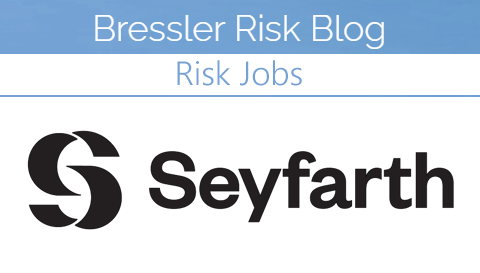BRB Risk Jobs Board — Client Contracts Analyst (Seyfarth)
Posted onThis week, I’m pleased to highlight a new open role at Seyfarth (see also their open “Client Contracts Counsel” position): “Client Contracts Analyst” —
- As part of the firm’s Office of General Counsel, the Client Contracts Analyst involves the exercise of discretion and independent judgment in reviewing, negotiating, documenting, and managing non-standard client engagement terms, outside counsel guidelines, and requests for proposals (RFPs).
- The position collaborates closely with a compliance paralegal to oversee workflow and support the tracking and reporting of key statistics and trends related to client engagement documentation.
- The role is also responsible for maintaining and optimizing the firm’s client engagement document database (Intapp Terms), ensuring it serves as an effective tool for mitigating risk. Acting as a central liaison, this position facilitates communication and coordination among various firm departments involved in client acquisition and intake, firm leadership, relationship partners, and other professional staff.
On any given day, you will:
- Review, negotiate, track, document, and store Outside Counsel Guidelines (OCGs), non-standard engagement letters, GDPR documentation, RFPs, and other client contracts to ensure compliance with the firm’s ethical and business obligations.
- Draft correspondence to address terms of engagement that do not align with Seyfarth’s policies, procedures, ethics, loss prevention, and risk tolerance.
- Negotiate directly with clients at direction of relationship partner.
- Maintain an efficient and transparent depository and quick-reference resource(s) regarding client engagement terms.
- Solicit and coordinate feedback and approval on non-standard client contracts from Seyfarth subject matter experts.
- Implement client requirements such as obtaining conflicts searches on clients’ corporate affiliates, requesting ethical or confidentiality walls, providing client notices, updating and maintaining the firm’s various databases and document management systems.
- Assist in follow-up to ensure that executed engagement documents are obtained.
You Have:
- A bachelor’s degree, paralegal certificate, juris doctor degree, or equivalent experience
- Ability to analyze complex documents and communicate results of analysis concisely and professionally
- Ability to maintain effective relationships with a diverse group of attorneys, clients, and professional staff
- Close attention to detail, the ability to follow instructions, and excellent troubleshooting, proactive problem resolution, and follow-through skills
- A high degree of initiative and critical-thinking skills along with the ability to exercise independent judgment , and manage multiple priorities in a fast-paced work environment.
- Ability to learn and utilize specific internal or third-party Conflicts Department software as well as relevant firm computer software programs
- Excellent organizational skills, including record keeping and data collection
See the complete job posting for more details on the job and to apply for this position.
About Seyfarth
At Seyfarth, we understand that great people are the key to our success, and we provide the opportunities to match. If you join us, you’ll work with state-of-the-art technology in a friendly and professional environment, and we will continue to invest in your professional development. If you want the freedom to grow at a firm that is invested in your future, apply on our website.
For more detail, see their careers page.
And if you’re interested in seeing your firm’s listings here, please feel free to reach out…









